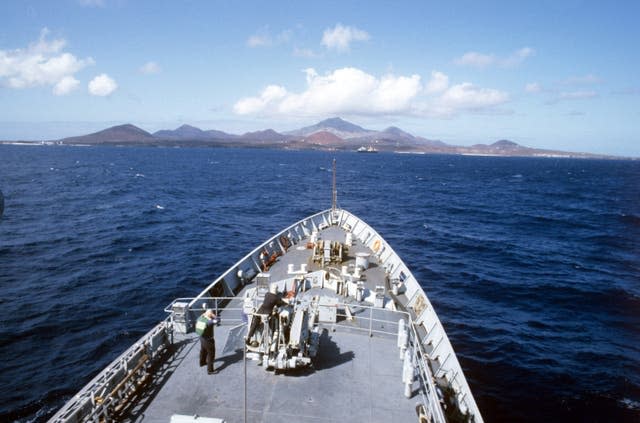Ex-prime minister May warns over offshore asylum processing centre proposal
Theresa May has sounded warnings over the prospect of the UK sending asylum seekers to Australia-style offshore processing centres.
The former prime minister said she considered the idea when home secretary but rejected the option due to “practical concerns”.
Criminal gangs would continue to traffic people under the measures as they would wait for people to have their application rejected and then attempt to move them to the UK from the site of the centre, Mrs May added.
Her remarks came as MPs considered the Nationality and Borders Bill, which includes clauses to allow the UK to be able to send asylum seekers to a “safe third country” and to submit claims at a “designated place” determined by the Secretary of State.
Officials believe the Bill gives the potential to allow for offshore processing centres to be set up overseas, akin to policies used in Australia.

Reports have suggested the UK is considering sharing a processing centre with Denmark in Rwanda and may even revive speculation over suggestions that Ascension Island could be sought as another destination.
Speaking at second reading of the Bill, Mrs May said: “There is this concept that Britain could process asylum claims outside the UK.
“This was an issue that came up when I was Home Secretary, there was a lot of discussion with the European Union, we didn’t go down that route for practical concerns.
“It wouldn’t automatically remove the business model of the criminal gangs because they would be getting people to the centre and waiting for those who are rejected by the centre, and they’d still move those people across the Mediterranean.
“So there’s a potential increase of people being picked up and being taken into slavery.
“And there’s also the problem of what you do with those people who are rejected for asylum but who cannot be returned to their country of origin.
“Also the concept of allowing asylum to be granted outside the UK is a major step and it has ramifications, for example, for any Royal Navy or Border Force vessel that’s operating humanitarian missions in the Mediterranean.”
The Bill is intended to deliver sweeping reforms of the asylum system.
This includes giving Border Force officers powers to turn migrants away from the UK while at sea, and making it a criminal offence to knowingly arrive in the UK without permission – with the maximum sentence for those entering the country unlawfully rising from six months’ imprisonment to four years.
For the first time, how someone enters the UK – legally or “illegally” – will have an impact on how their asylum claim progresses and on their status in the UK if that claim is successful.
On the new offence, Mrs May said: “We must not send the message that somebody who is genuinely fleeing from persecution and whose only route out of that persecution is to the UK is automatically going to be seen as a criminal.”
Convicted people-smugglers could also face life behind bars, up from the current maximum tariff of 14 years, under the proposals.

Mrs May earlier defended her record at the Home Office and intervened on Home Secretary Priti Patel to note immigration is an issue which constantly needs to be looked at rather than “thinking that one piece of legislation will deal with the problem forever”.
Ms Patel went on to say “genuine people are being elbowed aside” by those paying traffickers to come to the UK, adding the principle of seeking refuge has been “undermined” by people “paying their way to travel through safe countries” to claim asylum in the UK.
She told MPs: “People should be claiming asylum in the first safe country that they reach and not using the UK as a destination of choice. That is why our intention is to address this wider system to fix this problem so that we can help those who are in genuine need to resettle here.”
Ms Patel also said 8,500 people arrived in the UK by “small boat” in 2020, adding: “Eighty-seven per cent of them were men and 74% of them were aged 18 to 39, so those who claim it is heartless to stop these illegal crossings have it all the wrong way round.
“Because it’d be heartless and immoral to let them continue to do so in the way in which they are through those dangerous and perilous journeys because people have drowned in the Channel, and thousands – even recently – have died in the Mediterranean.”
Labour is seeking to block the Bill and accused the Government of trying to create a “two-tiered” approach to asylum claims.


